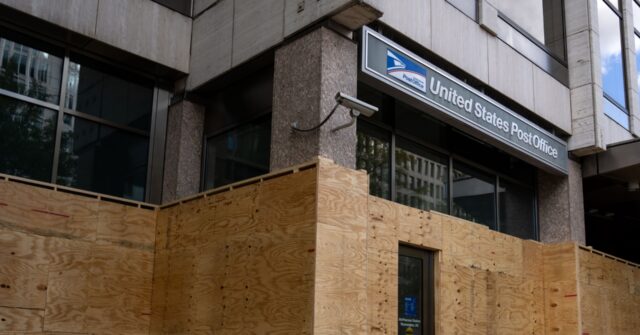As Election Day approaches, businesses in deeply Democratic cities like Portland, Oregon, and Washington, DC, are taking precautions by boarding up their establishments in anticipation of potential unrest. Reports indicate that banks, small businesses, and various office buildings in downtown Portland have plywood secured over their windows and doors to shield against potential vandalism. The residents’ fears are rooted in the city’s recent history; violence erupted following the 2016 election of Donald Trump and intensified after the police killing of George Floyd in 2020. Among the concerned property owners is real estate developer Jordan Schnitzer, who has invested approximately $20,000 to board up three of his properties. Schnitzer expressed deep disappointment at the normalization of such behaviors in American society and questioned the message this sends to the younger generation.
In Washington, DC, similar sentiments echo as local businesses prepare for possible disturbances. Given the city’s proximity to the White House, the preemptive measures being adopted are indicative of the anxiety felt on the streets. During a recent public safety meeting, Ward 2 Councilmember Brooke Pinto addressed the concerns voiced by community members and business owners regarding safety during the election period. She noted that they have received numerous inquiries about clerical preparations to secure their premises, signaling a palpable sense of unease in anticipation of disruptive protests or violence. As the political climate grows increasingly tense, the urgency to take protective measures signifies that many are bracing for a repeat of the chaos seen in years past.
Specific businesses are already taking steps to minimize risks, with reports of prominent establishments, including various eateries and shops, boarding up their access points while still remaining operational for customers. For instance, McDonald’s and the Frame Mender have already taken precautionary actions, further underscoring the fear that accompanies the impending election. Despite some businesses continuing to operate normally, the visible presence of boarded-up businesses in key areas informs both locals and visitors of the underlying tensions that could potentially escalate into violence as Election Day looms.
One visitor to Washington, DC, Joeri Vanbroekhoven, expressed his dismay at the necessity of these precautionary measures. While acknowledging that some level of preparation is warranted given the precedents set by past events, he lamented that it has come to this—that businesses feel they must protect themselves from foreseeable protests and vandalism. Vanbroekhoven’s reaction reflects a growing sentiment among citizens who are not only concerned for their safety but also saddened by the erosion of public order that necessitates such drastic steps in a supposed democracy.
The collective response by businesses in both cities highlights a broader atmosphere of anxiety and unease that seems to have enveloped the nation in light of recent social and political upheaval. Observers note that the visibility of such security measures may deter peaceful protests and spark unnecessary confrontations, further aggravating tensions around an already highly-charged political event. The intersections of fear, historical context, and societal frustration culminate in a climate where community members feel compelled to take protective actions in anticipation of potential electoral fallout.
As Election Day draws closer, the psychological toll on both business owners and everyday citizens becomes increasingly apparent. The longing for a peaceful electoral process clashes with the reality of escalating tensions, leading to a paradox where security measures, while necessary, also serve as a stark reminder of the challenges faced by contemporary society. The hope remains that the nation can move through this election period without returning to the chaos that marred its recent history, yet the memories of past turmoil linger, compelling many to err on the side of caution. Ultimately, the stakes are high as the narrative unfolds, drawing attention to the implications that these precautions hold for democracy, societal norms, and community resilience.

